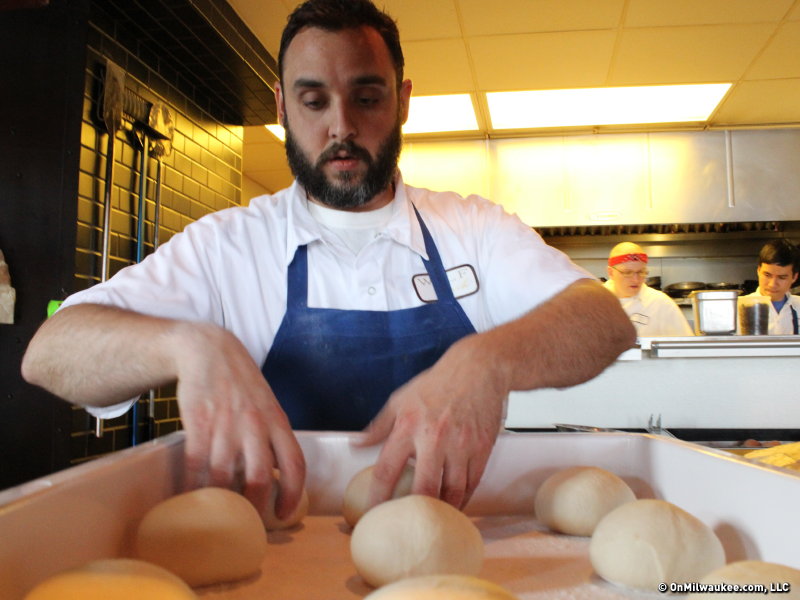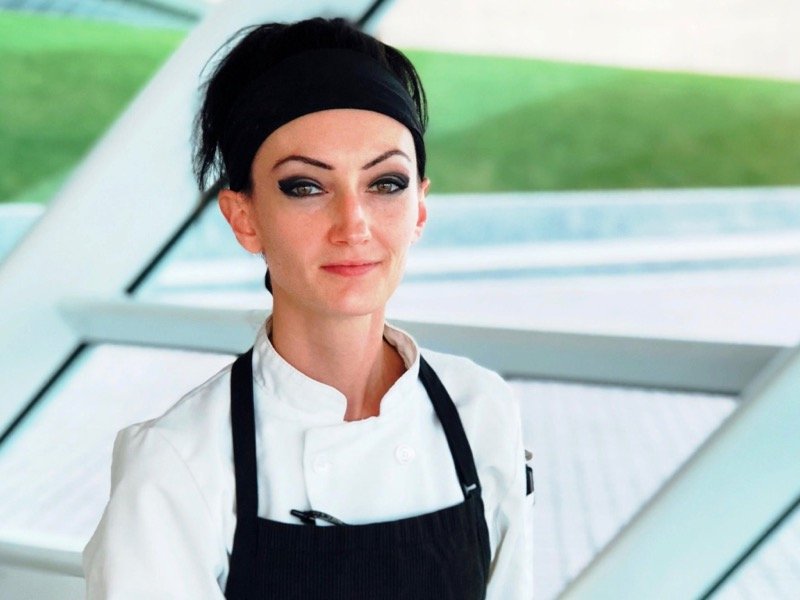Despite his obvious talent for toiling to produce the perfect pizza dough, Kyle Toner never had ambitions to wrangle the power of a wood-fired oven into submission. Or, at least he didn’t think he did.
Originally from New Jersey, Toner studied biology and anthropology in college before taking up residence in the rough and tumble cut-throat world of restaurant life.
"I started working in restaurants toward the end of college," he told me. "Really couldn’t see myself transitioning into a career within what I was studying. I never second-guessed it or looked back."
After working in high-end New York establishments, including The Spotted Pig, Rose Water and Motorino, Toner took a trip to Spain, where he staged in a restaurant in Saint Sebastian in Basque country. At the time, Spain was the place where the modern, avant-garde was coming from, so Toner figured he’d get some great experience to bring back with him to New York.
"That’s where I decided that I didn’t want to do the high-end, avant-garde food anymore," he says. "I had a job lined up in New York with one of my old bosses in a three-star Michelin restaurant. But, when I came back I told him I didn’t want the job. I didn’t want to stay in New York."
That’s when Toner found his calling. He took a job at Queen Margherita, a Neopolitan pizzeria in Nutly, N.J.
"Those guys opened that place in 2004 and people thought they were like martians landing," Toner explains. "People didn’t get the wood-fired oven concept. But, they were from Naples, they’d been doing that since they were like 10 … in Naples every restaurant has a wood-fired oven."
During his time at Queen Margherita, Toner mastered the art of dough and honed the craft of working the quirky hand-made wood-fired oven.
When he and his wife decided to move closer to Lake Geneva, where her family lives, he applied as a line cook at Roots. But, within months of his arrival Roots closed, and that turned out to be a blessing in disguise. He was recruited to run the newly installed wood-fired oven at Wolf Peach. And the rest, as they say, is history.
Toner’s title belies a wealth of knowledge far beyond that of a typical sous. More of a specialist than generalist, Toner builds on a wealth of kitchen experience to create unique wood-fired creations and teach staff how to mind the often finicky oven.
I sat down to talk with him about his experiences in dining, and his aspirations for the future.
OnMilwaukee.com: What do you wish you had known when you took your first sous chef position?
Kyle Toner: My first sous chef job was a pretty easy transition for me. I had already worked in an intense work atmosphere where you were really responsible for your own things. I transitioned to a small farm-to-table restaurant from there. Within less than a week, my boss had to go away for a wedding. So, I was the boss for several days. That was good. I was prepared for that. I didn’t jump into it before I was ready.
That said, I don’t think a lot of the young guys are prepared with the sort of skill set they need. You can’t jump ahead of yourself. You need a really strong – and broad – range of skills. It’s not only about knowing how to do things, but having respect from your peers and being able to teach them.
People think they’re ready after working for 3-4 years in one kitchen. But, all you really know is that one kitchen. But, how are you going to teach someone how to do something you barely know yourself?
OMC: From your point of view, what’s the most important role a sous chef plays?
KT: The liaison role – between the chef and the cooks. You’re a go-between. The chef shouldn’t have to be standing next to a cook and showing them how to do something. So, that falls to the sous. It’s a pretty crappy job because you are responsible for either executing or distilling the chef’s vision.
It’s great when you have a longer working relationship with a chef. So, when he or she says something you know what he means and can interpret it and translate it down the line. I’m lucky in the sense that I’m a little bit outside of it in this restaurant.
OMC: What does your role constitute?
KT: They put the oven in here. I lit the oven on the first day, and it was handed over to me. I had the expertise to get it running. Chase Anderson had started researching dough, but he had way too much on his plate. So, I told him "I have experience with this; I’ll take this." We were able to hit the ground running.
I spend my time working the oven, making the dough, stretching the pizza, and dialing in the cooks … refining the techniques – cutting the cheese, for instance. If you cut it in different sizes, it cooks differently. That’s another thing that sous chefs do. You’re refining their process. It’s easy to tell people what to do, but explaining why is a different story. That’s how people learn. That’s what they remember.
No two pizzas I’ve made are the same. There are so many variables … each pizza is unique. But that’s the beauty of it. Same fire, same dough. But, even the people make a difference. Dough is alive, temperatures vary. It’s not a controlled environment. I like that; it keeps me interested. This isn’t manufacturing where I’m putting pizzas on a conveyer belt.
OMC: What’s the most challenging part of your job?
KT: Patience and teaching. I’m really East Coast in some ways. When I started here, people looked at me like I was an alien. I’m not a naturally patient person, and it takes a lot for me to play that role. It’s not really in my make-up.
It’s easy to say "get out of the way, I’ll do it myself." But, that’s not what a manager does. You need to let go and teach other people how to do it. I’ve gotten pretty good at it. But, that wasn’t always the case. I was nasty. That’s how I was treated, and I’m naturally short. But, that’s something you have to learn.
OMC: What’s the best part?
KT: Some people get off on the challenge of that long rack of tickets. Some people love the paperwork. There’s people who thrive in high volume environments. But, for me the best part is really having the chance to be involved. If you’re lucky enough to have a chef that works with you, you get specials, you get menu input. You start being creative.
If you’re good, you’re following food trends, you’re practicing classical techniques, and you get ahead.
That’s what really turned me onto this career. I like the craft, the repetition. But I also get to be creative. It’s different every day.
OMC: What have you learned most about yourself while working in the kitchen?
KT: It made me a better person, in general. You can ask my wife. I worked in Brooklyn when it was on the cusp of what it has become now. I found places that let me play.
In addition to working with the wood fired oven, I also got experience making charcuterie. I’d take meats in a duffel bag, and get on a bus out to my parents’ house and hang charcuterie in their root cellar.
The "why" plays to my science background. When you know the why, it plays to the "how." That’s where it really shifted for me. I found out I really like those things. I could go work at a butcher. I could keep making pizzas. The chance to explore on my own was great. The craft is really the difference between a line cook and a sous chef – and that’s where I settle in.
OMC: Of the chefs you’ve worked for, from whom did you learn the most? Why?
KT: I got different things from different places. At Spotted Pig I learned about working a busy, super popular place where Gwynth Paltrow is in the dining room with her kids.
Tocqueville, with George Mendez, is where I learned about refined, fine dining. The French style. That was intense. I worked my ass off. It was terrible. Our kitchen staff … we were like abused children who banded together. That’s where I got my cooking chops.
I also worked at a place called Rosewater, where I transitioned from sous chef to chef. That’s where I found my creativity. It’s also where I met my wife.
And then in Jersey, these two brothers … I learned a style of cooking and a technique of cooking that … the closest I’ve seen to it was in my mother and grandmother. It was totally different from what I’d ever learned. I learned a ton there.
OMC: How would you describe your cooking style or philosophy about food?
KT: If you had asked me five years ago, it would have been totally different. I grew up with southern Italian food in my house, my culture. That speaks to me more now than it ever did. Simple, good ingredients.
I’ve worked at hip, popular, notable places. I walked into the pizza place and thought to myself – this is the stereotypical red sauce Italian place. I thought it was cliché – but it really was Italy. I learned that when I went to Italy for myself.
OMC: Where do you envision yourself five, 10 years from now?
KT: My own restaurant. It will be wood-fired pizza. Southern Italian food. Smallish. Comfortable. I don’t want to recreate the last place I worked. But, I want the sense of community, neighborhood, friends.
You’d see 20 people walk in, and the staff would kiss and hug them. You’d see wait staff sitting down at tables.
Down the line, I’d like a classic French bistro.
Small plates here tend to be eclectic world-focused. But, I’d also like to do the Spanish tapas thing.
As a passionate champion of the local dining scene, Lori has reimagined the restaurant critic's role into that of a trusted dining concierge, guiding food lovers to delightful culinary discoveries and memorable experiences.
Lori is an avid cook whose accrual of condiments and spices is rivaled only by her cookbook collection. Her passion for the culinary industry was birthed while balancing A&W root beer mugs as a teenage carhop, fed by insatiable curiosity and fueled by the people whose stories entwine with every dish. Lori is the author of two books: the "Wisconsin Field to Fork" cookbook and "Milwaukee Food". Her work has garnered journalism awards from entities including the Milwaukee Press Club. In 2024, Lori was honored with a "Top 20 Women in Hospitality to Watch" award by the Wisconsin Restaurant Association.
When she’s not eating, photographing food, writing or planning for TV and radio spots, you’ll find Lori seeking out adventures with her husband Paul, traveling, cooking, reading, learning, snuggling with her cats and looking for ways to make a difference.







